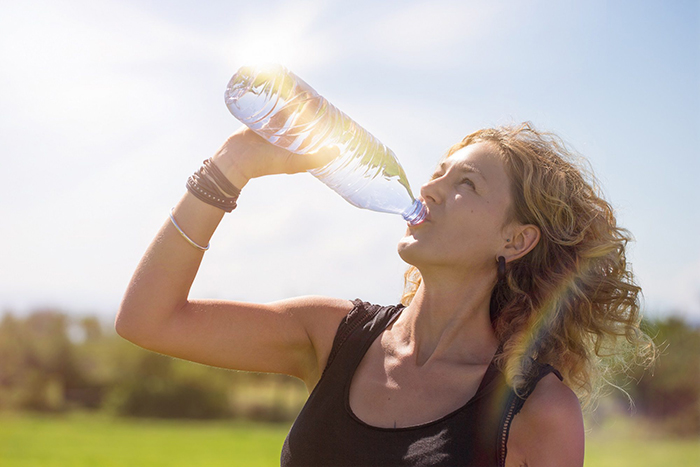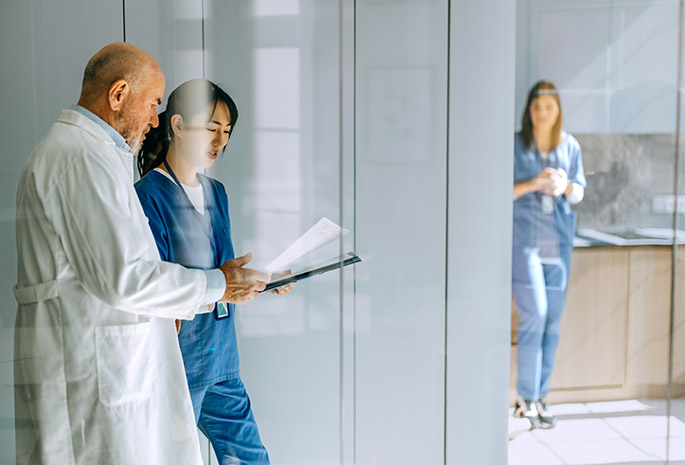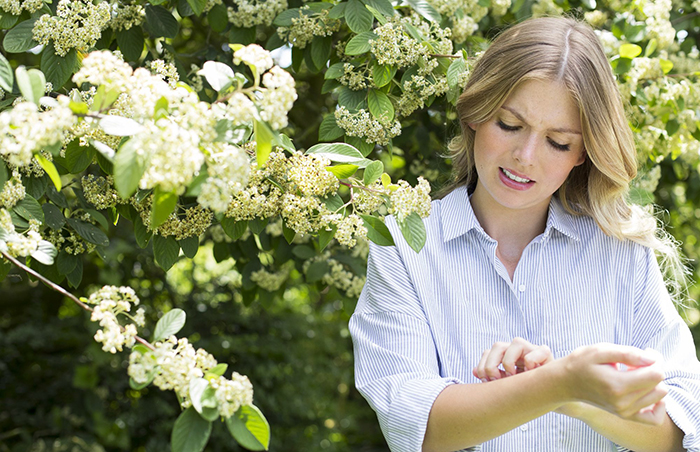Dr. Khan explains that sometimes burns can first look like just a red patch, but later can blister and become much more serious. She also recommends against wrapping a burn and cautions people to refrain from putting toothpaste on their burn. “It makes it feel better, and it’ll kind of cool the burn sensation,” she says, “but in the long term, it delays healing.”
People might also arrive at the ER because of a car accident, especially if one driver has been drinking. And around holidays, visits for mental health reasons increase because patients may feel lonely or isolated if they aren’t celebrating with family or friends.
Staying Safer During Summer Fun
Dr. Khan has a few tips for staying safer during summer activities:
- Take cooling breaks. Dr. Khan says, “If you’re at a barbecue, ask to go inside and spend about 5 or 10 minutes inside so your body has some time out of the heat.” She adds, “If you’re at the pool, get in—hydration is really important.” Finding shade is another good way to prevent heat-related injuries. “The shade is usually about 10 degrees cooler,” she says. “You won’t perspire as much, which doesn’t lead to as much dehydration.”
- Hydrate. “Be mindful of the food you eat because fruits and vegetables have a lot of water content in them.” In addition to drinking water, she says you can increase your water intake through those kinds of nutrient-dense foods.
- Don’t let kids handle fireworks. “Kids want to be a part of it—not necessarily lighting the firework, but maybe placing it,” Dr. Khan says. “And I usually recommend parents don’t do that. You don’t know if it’ll misfire, you don’t know how kids might react, or especially what younger kids are going to do with it.” Even sparklers can injure children, so the safest option is to attend a professional show and not handle fireworks at all. But if you do choose to have fireworks at home, use only those that are legal for consumer use in your location and never let children handle them—even to place them.
- Drink responsibly. “I usually tell people there should be one adult who’s not drinking,” says Dr. Khan. “You’re not necessarily intoxicated, but your inhibition and guards are down, so you’re more likely to say yes to kids when you shouldn’t.”
- Keep a first aid kit nearby. “I tell people to keep first aid kits with them because you’re more likely to have something happen. Pack that along with your cooler of ice and drinks,” Dr. Khan says. Make sure to add sunscreen and bug spray to your kit.
Preparing the Emergency Department for Holidays
Around July 4th and other holidays, Dr. Khan says patients who come into the ER are typically very ill and experiencing true emergencies. “If it’s not related to the burns or broken bones, the injuries I would see from a holiday weekend, then I really take a pause for every patient to ask, ‘What could this really be?’ because most people don’t come in on holidays unless they’re really ill,” she explains.
Because Emory Decatur Hospital and Emory Hillandale Hospital mostly treat adult patients, Dr. Khan says her team also refreshes itself on pediatric care before a holiday. “We’re an adult ER, but we see a lot of burn injuries or swimming- and pool-related injuries with kids, so we make sure our pediatric skills are up to par.”
What To Expect at an Emergency Department
If you do need to visit an emergency department, Dr. Khan says you should expect a few things:
- You’ll talk to a lot of people. “You may need to tell your story a lot of different times to a lot of different people,” she says. “There’s a lot of information and communication that occurs.”
- Waiting is normal. Patients might expect emergency departments to always be ready to go, but since other emergencies are also being treated, care may not always be immediate or patients may have to wait longer than expected. “If someone has a heart attack and can’t breathe, that person may have come in after you but they’re going to be seen sooner because their acuity is higher.” In emergency and critical care medicine, measures of acuity—the severity of a patient’s condition and the level of medical attention needed—are a part of determining how urgently care is needed.
- Testing still takes time. “If you visit your primary care physician and tell them you have stomach pain, they’ll order tests and you’ll follow up with your doctor to review the results—that can take as long as three weeks,” she says. “But the expectation in the emergency department is that it should happen in seconds. However, if you’re getting blood work, an X-ray and a CT scan, and it was all done in three hours, that’s actually pretty good.”
- Don’t hold anything back. Dr. Khan says giving your doctor the most information you can will improve your care. ”If there’s anything that’s bothering you or that’s on your mind that you think may not be related to the illness, it’s still really important to bring that up.”
Caring for Our Community
Dr. Khan, who has practiced emergency medicine at Emory’s DeKalb County locations for more than 17 years, is a part of the community—and so is her team. “A lot of the staff, doctors, advanced practice providers, PAs (physician assistants), and nurse practitioners actually live within the community. So when they work, they consider themselves as taking care of their neighbor,” she says.
“These are people that have been here for 10 years and longer and who are a part of the community. They’re committed to the community and want to keep people safe.”




